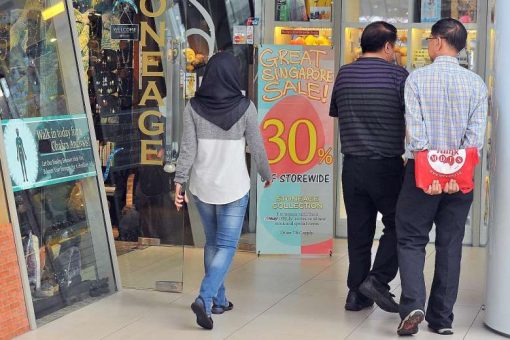THE STRAITS TIMES
Making Great Singapore Sale great again

Some retailers held their own sales earlier than the GSS to beat their rivals, dampening the effect of the annual event. But the Singapore Retailers Association cannot stop them nor dictate the duration of their sales. ST PHOTO: LIM YAOHUI
Experts look at what went wrong to see how event might be turned into a better draw
PUBLISHED OCT 2, 2016, 5:00 AM SGT
Melissa Lin (mailto:mellinjm@sph.com.sg)
With the relevance of the Great Singapore Sale (GSS) in doubt, going by falling retail sales, questions have been raised about what went wrong with the sale.
Many consumers have pointed out that the annual sale of 23 years is not that great, as the discounts offered here are not as steep compared with those in sales overseas.
They also lamented that the discounts are mostly for older merchandise. A possible reason for this is that Singapore has no seasons.
Associate Professor Prem Shamdasani, from the National University of Singapore Business School’s marketing department, said the summer sales in Tokyo and Hong Kong tend to be more successful than the GSS due to the seasonality of the products sold.
“(This) encourages (their) retailers to offer deep discounts to clear inventory and make room for new arrivals, which are also attractively marked down to entice local shoppers and tourists,” he said.
Offering steep discounts is also not sustainable for businesses here, said Singapore Polytechnic senior retail lecturer Sarah Lim.
“(This) will eat into the retailer’s overall profit, and with rental and manpower costs all added in, the retailer may not be able to sustain the business,” she said.
Singapore Retailers Association (SRA) president R. Dhinakaran previously said holding sales to clear old stock is common worldwide.
The retail scene has been slow in recent months. Latest official statistics show that retail sales excluding motor vehicles in June and July each fell 3 per cent over the same months last year.
This is despite the attempts for this year’s GSS – which took place from June 3 to Aug 14 – to draw tourists and residents with an extended sale, more payment options and a more targeted focus on tourists from China. The poor showing, and similar sales declines in June last year and 2014, prompted the SRA, which organises the GSS, to suggest a need to discuss with the Singapore Tourism Board about continuing the event or revamping it.
Retailers and retail experts have pointed to the slowing economy here and overseas as a key factor for the slump this year, but there are other concerns as well.
One issue raised about this year’s GSS is its length and timing.
The event started in June – a week later than last year – and was extended to 10 weeks to cover the bulk of China’s summer holidays.
In the past 12 years, the annual sale stretched over eight weeks.
But a 10-week sale might have led to sale fatigue among Singaporeans inundated with “end-of-season sales” or “anniversary sales” year round, said retail experts.
Research suggests that local consumers with strong spending power are disciplined spenders and tend to spend more during the early weeks of the GSS, said Dr Guan Chong, head of marketing programme at SIM University’s School of Business. “Thereafter, their spending pattern should likely stay low for the rest of the GSS period,” she said.
GSS’ new sale period also clashes with big sales elsewhere such as Tokyo’s famous end-of-summer sales, which start around the third week of July, she noted.
Then, there is the perennial problem of retailers holding their own sales earlier to beat their rivals, dampening the effect of the GSS.
Department stores Robinsons, Metro and OG started their GSS sales in May this year, while baby supplies store Mothercare and hardware chain Home-Fix held pre-GSS sales. Robinsons said this was done in line with shoppers’ expectations for the GSS to start in May, as in previous years. Mothercare did so because its competitors were also holding their sales early.
SRA cannot stop retailers from holding their sales earlier, or dictate the duration of their sales.
There also appears to be a lack of awareness of the GSS and whether it was still going on, in part because of its length, said experts.
Given this, events could be held every weekend during the GSS period to highlight store promotions by themes – such as food or children – to create buzz and remind people the sale is ongoing, said Mr Steven Goh, executive director of the Orchard Road Business Association.
Another suggestion is not to focus on only discounts. Dr Lynda Wee, an adjunct associate professor at Nanyang Business School, said the GSS should add a lifestyle spin and combine shopping and dining promotions with leisure deals, such as those for spa sessions, movies and cooking lessons.
Dr Chong said merchants can ride on the digital marketing wave to connect with an international audience, such as using popular social media platforms.
Still, lower retail sales should not be blamed on the GSS alone, said Ms Lim, adding: “Orchard Road, Raffles City, Marina (Bay) and Suntec (City) lack strong positioning. Can our malls be differentiated so that tourists desire to visit each one of them because they are different?”
Missing out on our exclusive articles?
Get two weeks of free access to The Straits Times and experience the best work from the ST newsroom. No credit card required.
Get 2-Week Free Access
Terms & Conditions | Data Protection Policy | Need help? Reach us here. | Advertise with us
SPH Digital News / Copyright © 2018 Singapore Press Holdings Ltd. Co. Regn. No. 198402868E. All rights reserved
https://www.straitstimes.com/singapore/making-great-spore-sale-great-again

